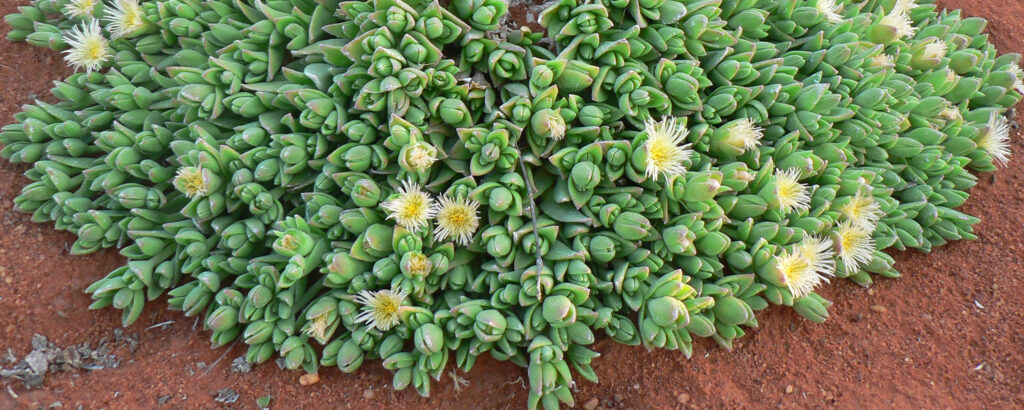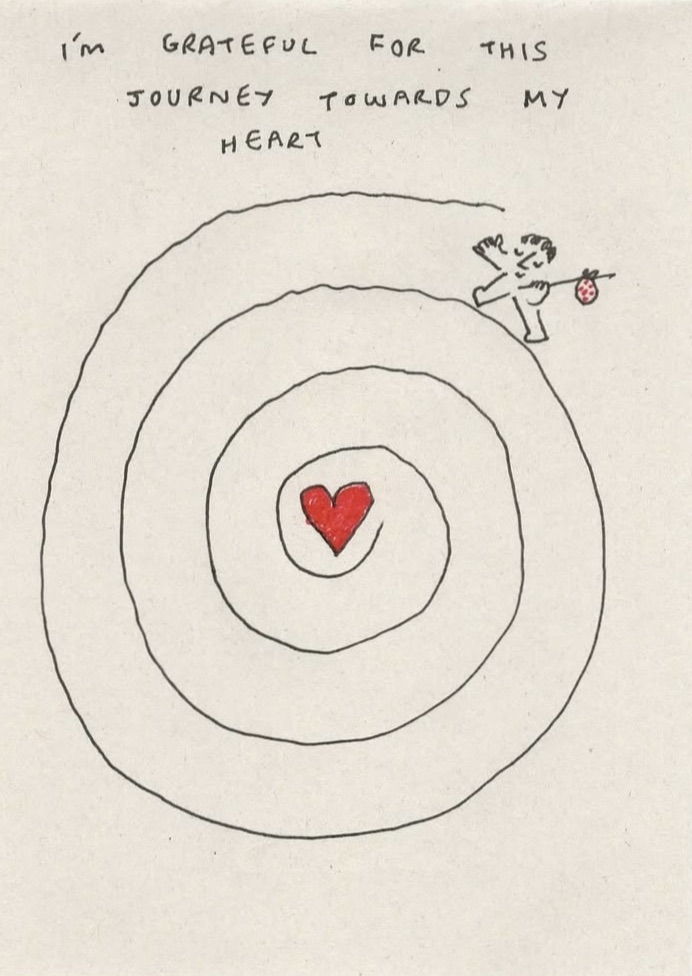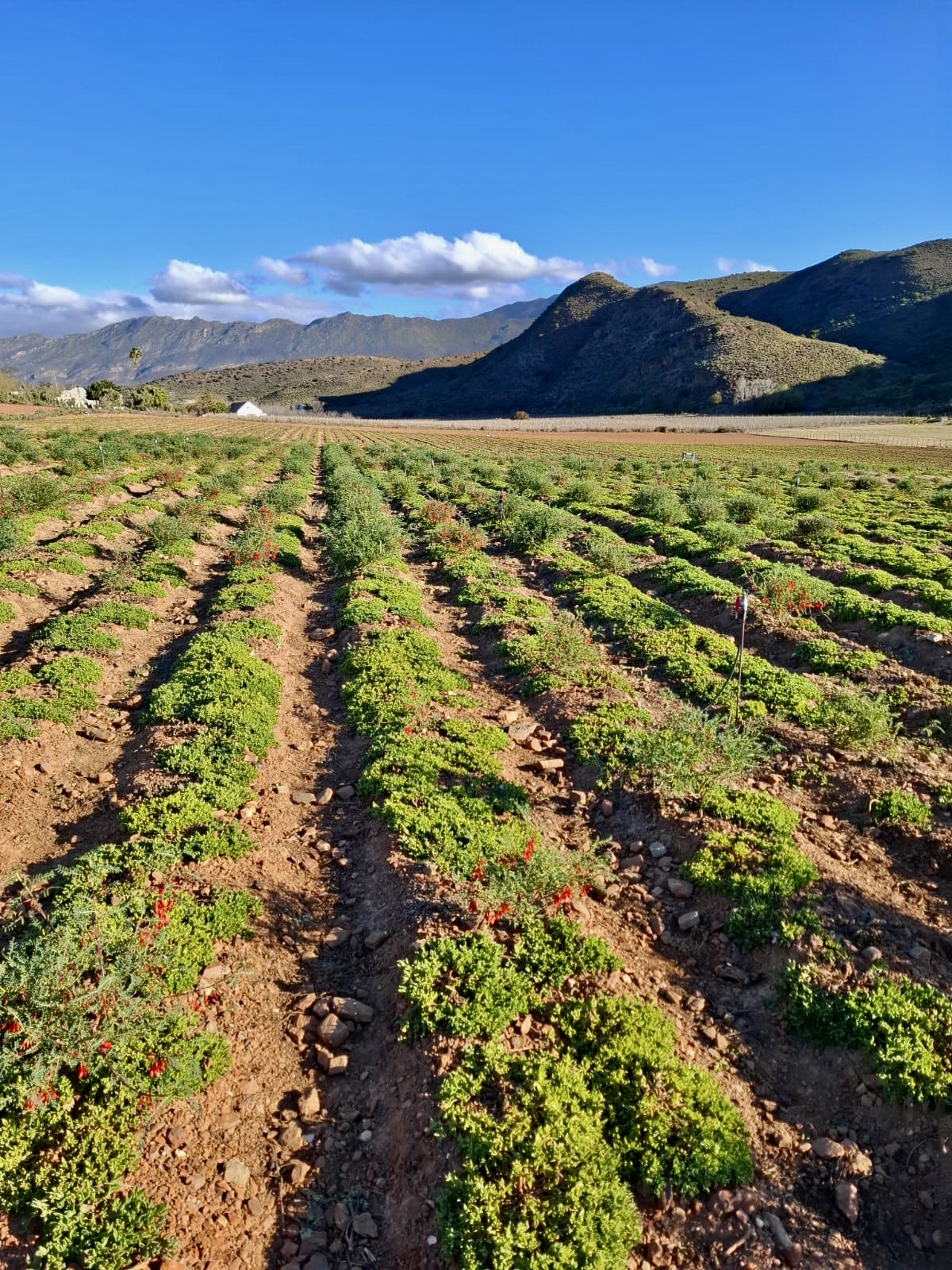Education
SEP 2025
The Happiest Plant on Earth
I am beyond excited to share with my Fungitas more about the plant that has completely rocked my world – Kanna (sceletium tortuosum). Alongside mushrooms, it’s the one external influence that’s had the greatest impact on my daily life, transforming the way I socialise and reshaping my relationship with alcohol. Kanna has softened me, lifted my spirits and brought me into flow state more times than I can count.
For me, Kanna isn’t just a plant medicine – it’s been a teacher. A catalyst for living more from the heart, for following passion and for deepening my connection with nature and with myself. Over the past year, Funga has been working closely with Kanna on something truly special. Dive into this article to learn why this plant is so extraordinary and to get a glimpse of what’s coming soon.

© The Sceletium Source
Origins
Kanna is a succulent native to South Africa’s Karoo Desert and parts of Namibia, where it still grows wild. Many researchers argue Kanna should have a protected designation (like Champagne), as its unique properties are tied to the Karoo’s environment.
Nearly harvested to extinction by Dutch explorers in the 1600s; the San and Khoi peoples protected and revived it. To this day, these communities continue to safeguard and share the ancient wisdom of Kanna’s superpowers. Traditionally, the San and Khoi peoples have used Kanna for millennia in nearly every aspect of life:

African Culture: The Khoisan People & Their Plants
What does Kanna do?
Kanna is psychoactive, but not psychedelic (coffee also falls into the psychoactive category). That means it can shift your mood and mental state, but it won’t cause hallucinations or take you on a cosmic journey.
So what does it do? Kanna is known to be:
An empathogen (enhances empathy and connection)
A euphoriant (brings feelings of joy)
An anxiolytic (relieves stress and tension)
An adaptogen (balances the nervous system)
A nootropic (supports brain health and cognition)
An aphrodisiac (studies show it helps men who struggle with erectile dysfunction)
A hypnotic (supports natural, restful sleep)
Ergogenic (boosts stamina and physical performance)
On top of that, it offers anti-inflammatory, antioxidant, antimicrobial and immune-supporting benefits. It is not surprising that it’s been used in ceremonial and therapeutic contexts for centuries.
Kanna is legal, safe and non-intoxicating in most parts of the world, including the U.S. (with the exception of Louisiana, which has banned it along with other gentle, consciousness-expanding plants like blue lotus and damiana).

Copyright @orfeot
What happens in the brain?
Kanna acts as a natural SSRI due to its ability to bind to serotonin receptors and inhibit PDE4. This dual action helps increase the availability of serotonin in the brain while also reducing the breakdown of signaling molecules involved in mood regulation. The result is a gentle but noticeable effect: reduced anxiety and stress, improved resilience to emotional triggers, and an overall uplift in mood and mental clarity, without the dependency often associated with pharmaceutical SSRIs.
True healing begins with recognizing that everything you need is already within you. Too often, we look outside ourselves for relief, but real sovereignty comes from reclaiming our independence.
This is where Kanna shines. Unlike many pharmaceuticals (such as SSRIs) that can create dependency, Kanna helps regulate the amygdala, which is the brain’s fight-or-flight center. Over time, it reduces reactivity to stressors and supports daily wellbeing without dependence on anything external. Kanna acts as a supportive ally: a plant that offers relief when needed but ultimately encourages you to walk your own path.

Copyright @hotelcorazon
Kanna … Nature’s MDMA?
Kanna is often compared to MDMA because both are empathogens, substances that open the heart, foster joy and enhance connection. But there are important differences:
* Similarities: Both act on serotonin, dopamine and opioid receptor sites, producing feelings of openness and empathy.
* Differences: MDMA contains amphetamines, making it stimulating, intense and often followed by a serotonin “crash.”
Kanna is natural, gentler and without the speediness or depletion.
A useful analogy: MDMA is to Kanna as cocaine is to coffee. Both may act on similar pathways, but one is overwhelming and synthetic, while the other is natural, subtle and sustainable.
Where MDMA can sometimes create forced or inauthentic connection, Kanna fosters authentic vulnerability, removing just enough ego for genuine, heart-centered connection without exaggeration or depletion the next day.

Boogie Nights
Research & Standardization
Kanna contains over 30 different active compounds, known as alkaloids. Two of the most important are mesembrine, which acts like a natural SSRI to support mood, and mesembrinone, which helps boost feelings of wellbeing by reducing stress and contributing to gentle euphoria. Thanks to new extraction methods, these alkaloids can now be standardized – for example, to 3–5% mesembrine – making Kanna products more consistent and reliable.
One of the best-known standardized extracts is Zembrin®, which has FDA approval as a dietary ingredient and has been the focus of much of the clinical research. Studies suggest that Kanna may have powerful benefits, including relieving anxiety and depression, easing pain and even supporting people in overcoming addiction.

Funga Chocos Co-Founder @cordeliafleming
What benefits will you noticeably feel?
*Brighter Mood & Balanced Energy – Kanna is best known for its ability to elevate mood. Its primary alkaloid, mesembrine, works in two powerful ways: it supports the natural release of serotonin while also preventing its reabsorption, giving your body more of this “feel-good” neurotransmitter to work with. At the same time, Kanna enhances dopamine (the neurotransmitter linked to pleasure and motivation) and inhibits the enzyme PDE4, which contributes to a subtle yet noticeable boost of energy. This unique combination explains why Kanna can feel grounding and uplifting at once – a centering effect that mirrors the balance found in nature itself.
*Physical Vitality – Kanna doesn’t just affect the mind, it supports the body too. Its alkaloids show anti-inflammatory properties and can even interact with opioid receptors, providing pain relief without risk of addiction. Kanna also engages with receptors tied to gut health, appetite and metabolism, suggesting benefits for those dealing with inflammation, obesity or overeating. Some evidence even points to its role in balancing the microbiome, making Kanna a quiet ally for overall physical resilience.
*Clarity & Focus – By inhibiting PDE4, Kanna also offers benefits that extend beyond mood. PDE4 inhibitors are associated with cognitive protection and enhanced mental performance. Research suggests Kanna may support memory, executive function and cognitive flexibility, with potential applications for ADHD and even early-stage Alzheimer’s. By easing everyday stress, Kanna can also help improve focus – letting you feel clear, present, and mentally agile.
*Sleep Support & Relaxation – Kanna’s relationship with GABA and melatonin receptors links it to improved sleep quality. By calming brain activity and reducing stress, it can help the body ease into rest more naturally. Since serotonin and melatonin are closely connected, Kanna’s influence on serotonin may further support healthy sleep rhythms. That said, Kanna can be stimulating when first consumed, so while it may improve sleep patterns over time, it’s best not to take it immediately before bed.
*A Happy Ending for everyone – As both an empathogen and an aphrodisiac, Kanna has long been associated with connection and pleasure. Taken with intention, it can open space for deeper communication, emotional vulnerability, and heightened sensitivity to touch. Its serotonin-modulating effects may help address low libido, and ongoing research is exploring its potential in supporting erectile function, premature ejaculation, and menstrual discomfort.

Kanna Fields Forever
Tune in to the Funga podcast for a deep dive into all things Kanna with Phoebe McPherson, co-founder of Function and FunGuy.
Kanna is rising in relevance because it bridges the gap between wellness supplements and psychedelics: it’s legal, safe, heart-opening, clinically promising and arriving just as the world is hungry for natural, reliable tools for mental health and authentic connection.
Funga has turned to chocolate as the perfect vessel to share this remarkable plant. While Kanna products are already making waves in the U.S., this will be the first of its kind in the United Kingdom. We can’t wait to share our first FUNGA CHOCOS For Grooving blend with you and help transform the rhythm of your days and nights.
WATCH THIS SPACE